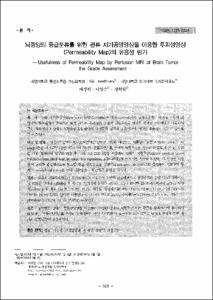뇌종양의 등급분류를 위한 관류 자기공명영상을 이용한 투과성영상(Permeability Map)의 유용성 평가
- Keimyung Author(s)
- Chang, Hyuk Won
- Department
- Dept. of Radiology (영상의학)
- Journal Title
- 방사선기술과학
- Issued Date
- 2009
- Volume
- 32
- Issue
- 3
- Abstract
- Purpose : This study was conducted to assess how effective the permeability ration and relative cerebral blood volume ratio are to tumor through perfusion MRI by measuring and reflecting the grade assessment and differential diagnosis and the permeability and relative cerebral blood volume of contrast media plunged from blood vessel into organ due to breakdown of blood-barrier in cerebral. Subject and Method : Subject of study was 29 patients whose diagnosis were confirmed by biopsy after surgery and 550 (11 silce × 50 image) perfusion MRI were used to make image of relative cerebral blood volume with the program furnished on instrument. The other method was to transmit to private computer and the image analysis was made additionally by making image of relative cerebral blood volume-reformulated singular value decomposition, rCBV-rSVD and permeability using IDL.6.2 In addition, Kruskal-wallis test tonggyein non numerical average by a comparative analysis of brain tumors Results : The rCBV ratio (Functool PF; GE Medical Systems and IDL 6.2 program by analysis) and permeability ratio of tumors were as follows; high grade glioma(n=4), (14.75, 19.25) 13.13. low grade astrocytoma(n=5) (14.80, 15.90) 11.60, glioblastoma(n=5) (10.90, 18.60) 22.00, metastasis(n=6) (11.00, 15.08). 22.33 meningioma(n=6) (18.58, 7.67), 5.58. oliogodendroglioma(n=3) (23.33, 16.33, 15.67. Conclusion : It was not easy to classify the grade with the relative cerebral blood volume ration measured by using the relative cerebral blood image by type of tumors, however, permeability ration measured by permeability image revealed that the higher the grade of tumor, the higher the measured permeability ratio, showing the assessment of tumor grade is more effective to differential diagnosis.
목 적 : 관류 자기공명영상(perfusion MRI)을 이용하여 대뇌(cerebral)에서 혈액뇌장벽의 파괴로 인하여 조영제가 혈관내에서 조직으로 빠져 나가는 투과정과 상대적 뇌혈류량을 영상화 해보고, 이 영상을 이용하여 구한 투과성비와 상대적 뇌혈류량비가 종양의 악성등급 평가와 감별진단에 어떠한 유용성이 있는지 알아보고자 하였다. 대상 및 방법 : 영상의학진단과 병리조직검사로 진단된 29명을 대상으로 뇌종양이 포함된 550(11 silce × 50 image)관류 장기공명영상을 3T기기에 장착된 프로그램으로 상대적 뇌혈류량을 영상화 하였고, 다른 한 방법은 개인 컴퓨터에 영상을 전송 후 IDL 6.2 프로그램을 이용하여 상대적 뇌혈류량(relative cerebral blood volume-reformulated singular value decomposition, rCBV-rSVD)과 투과성을 영상화 하였다. 그 영상을 이용하여 동일한 관심영역으로 화소별 평균 신호강도를 정량적(quantitative analysis)으로 측정하여 비모수적 통계인 kruskal-wallis test 통해 뇌종양별로 평균비교 분석을 하였다. 결과 : 상대적 뇌혈류량영성과 투과성영상을 이용하여 동일한 관심영역으로 정상부위와 종야부위의 정량적으로 분석한 상대적 뇌혈류량 비 와 (3T 기기자체 분석한 값, IDL 6.2로 분석한 값) 투과성비에 고등급 성상세포종(n=4)의 경우 (14.75, 19.25) 13.13, 저등급 성상세포종(n=5) (14.80, 15.90) 11.60, 아세포종(n=5) (10.90, 18.60) 22.00, 전이성 뇌종양(n=6) (11.00, 15.08) 22.33, 수막종(n=6) (18.58, 7.67) 5.58, 핍돌기 신졍교정(n=3) (23.33, 16.33) 15.67로 나타났다. 결론 : 종양별로 상대적 혈류량영상을 이용하여 측정한 상대적 뇌혈류량 비는 등급을 분류하기에 용이하지 않았지만, 투과성영상으로 측정한 투과성비는 종양 악성정도가 높을수록 높은 것으로 나타나 종양의 등급 평가와 감별진단에 유용하였다.
- Alternative Title
- Usefulness of Permeability Map by Perfusion MRI of Brain Tumor the Grade Assessment
- Keimyung Author(s)(Kor)
- 장혁원
- Publisher
- School of Medicine
- Citation
- 배성진 et al. (2009). 뇌종양의 등급분류를 위한 관류 자기공명영상을 이용한 투과성영상(Permeability Map)의 유용성 평가. 방사선기술과학, 32(3), 325–334.
- Type
- Article
- ISSN
- 1225-2854
- Appears in Collections:
- 1. School of Medicine (의과대학) > Dept. of Radiology (영상의학)
- 파일 목록
-
-
Download
 oak-bbb-4311.pdf
기타 데이터 / 1.89 MB / Adobe PDF
oak-bbb-4311.pdf
기타 데이터 / 1.89 MB / Adobe PDF
-
Items in Repository are protected by copyright, with all rights reserved, unless otherwise indicated.